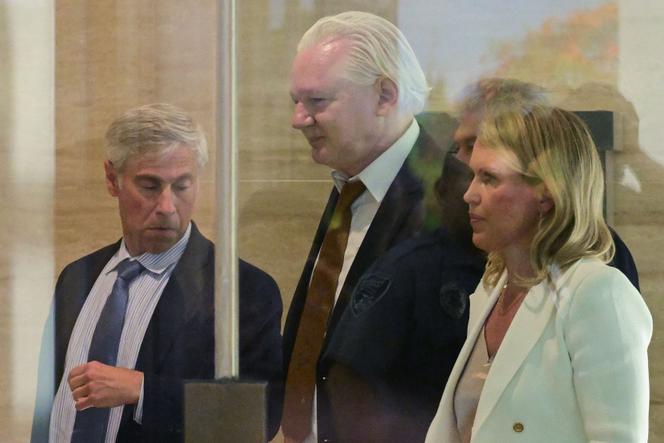


WikiLeaks founder Julian Assange pleaded guilty on Wednesday, June 26, to a single felony charge for publishing US military secrets in a deal with Justice Department prosecutors that secures his freedom and concludes a drawn-out legal saga that raised divisive questions about press freedom and national security.
The plea was entered Wednesday morning in federal court in Saipan, the capital of the Northern Mariana Islands, a US commonwealth in the Pacific. He arrived at court shortly before the hearing was to begin, wearing a dark suit with a tie loosened at the collar, and entered the building without taking questions.
Though the deal with prosecutors required him to admit guilt to a single felony count, it would also permit him to return to his native Australia without spending any time in an American prison. He had been jailed in the United Kingdom for the last five years, fighting extradition to the United States on an Espionage Act indictment that could have carried a lengthy prison sentence in the event of a conviction.
The Australian whistleblower will fly to the Australian capital Canberra within hours. "Expected to depart in 2 hours, 58 minutes. To Canberra, Australia," WikiLeaks said in a social media post, as Assange faced court in the Pacific US territory of the Northern Mariana Islands.
The abrupt conclusion enables both sides to claim a degree of victory, with the Justice Department able to resolve without trial a case that raised thorny legal issues and that might never have reached a jury at all given the plodding pace of the extradition process. Meanwhile, Assange’s wife, Stella, told the BBC that she was "elated" at the news as her husband flew on a chartered jet to Saipan en route to walking free.
WikiLeaks, the secret-spilling website that Assange founded in 2006, applauded the announcement of the deal, saying it was grateful for "all who stood by us, fought for us, and remained utterly committed in the fight for his freedom."
The deal, disclosed Monday night in a sparsely detailed Justice Department letter, represents the latest and presumably final chapter in a court fight involving the eccentric Australian computer expert who has been celebrated by supporters as a transparency crusader but lambasted by national security hawks who insist that his disdain for government secrecy put lives at risks and strayed far beyond the bounds of traditional journalism duties.
The US Justice Department agreed to hold the hearing on the remote island because Assange opposed coming to the continental US and because it’s near Australia, where he will return after he enters his plea.
The guilty plea resolves a criminal case brought by the Trump administration Justice Department in connection with the receipt and publication of war logs and diplomatic cables that detailed US military wrongdoing in Iraq and Afghanistan. Prosecutors alleged that he conspired with former Army intelligence analyst Chelsea Manning to obtain the records and published them without regard to American national security, including by releasing the names of human sources who provided information to US forces.
But his activities drew an outpouring of support from press freedom advocates, who heralded his role in bringing to light military conduct that might otherwise have been concealed from view. Among the files published by WikiLeaks was a video of a 2007 Apache helicopter attack by American forces in Baghdad that killed 11 people, including two Reuters journalists.
